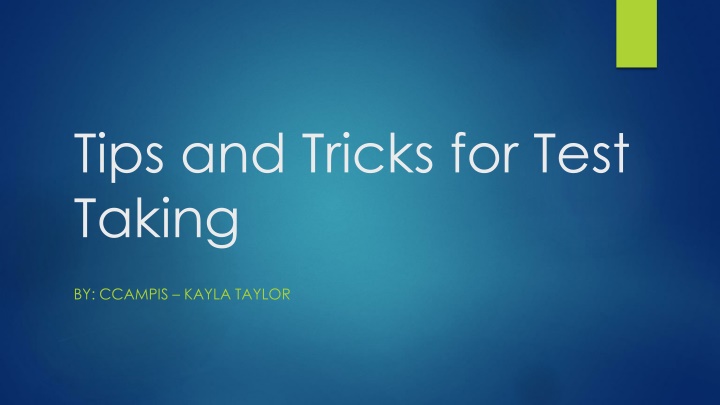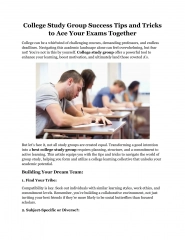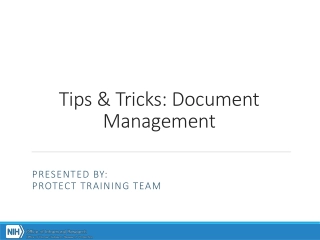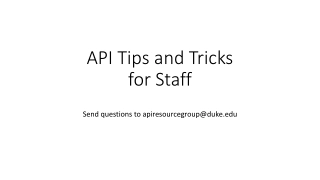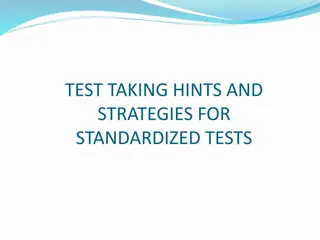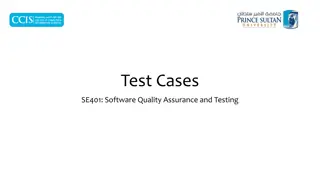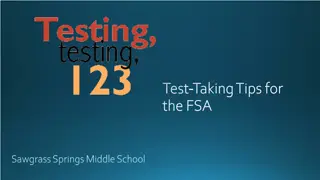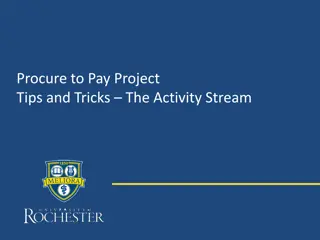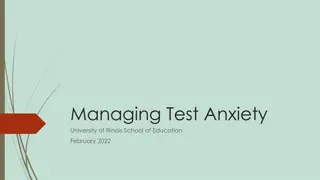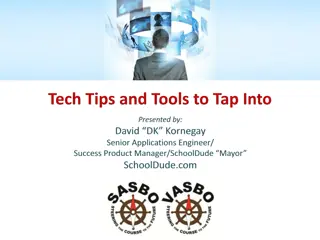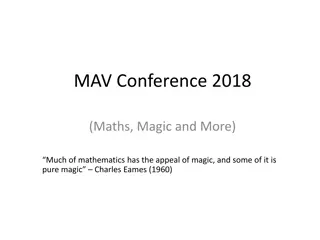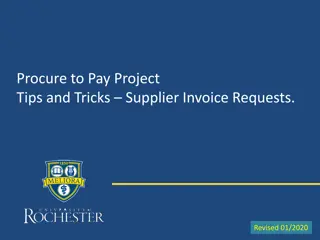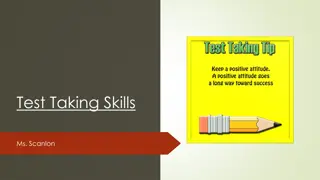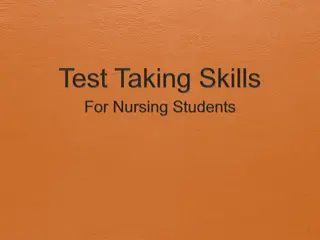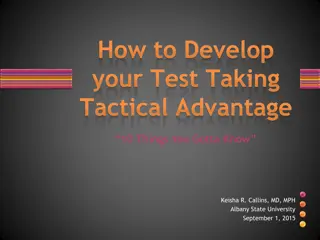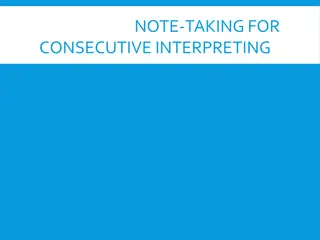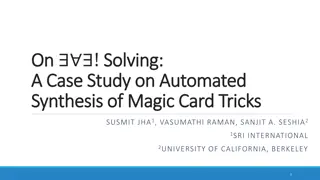Tips and Tricks for Test Taking
Enhance your test-taking skills with pre-test preparation tips, strategies for managing test anxiety, suggestions for handling exams, and insights for tackling true/false questions. Discover techniques to review notes regularly, avoid cramming, and optimize your performance during exams. Benefit from advice on calming pre-exam rituals, following directions accurately, and differentiating true/false statements effectively.
Download Presentation

Please find below an Image/Link to download the presentation.
The content on the website is provided AS IS for your information and personal use only. It may not be sold, licensed, or shared on other websites without obtaining consent from the author.If you encounter any issues during the download, it is possible that the publisher has removed the file from their server.
You are allowed to download the files provided on this website for personal or commercial use, subject to the condition that they are used lawfully. All files are the property of their respective owners.
The content on the website is provided AS IS for your information and personal use only. It may not be sold, licensed, or shared on other websites without obtaining consent from the author.
E N D
Presentation Transcript
Tips and Tricks for Test Taking BY: CCAMPIS KAYLA TAYLOR
Pre-Test Prepping Review your notes on a daily basis Set yourself a solid study schedule fight that procrastination! Avoid cramming! It doesn t work as well as you think it does! Ask your professor about what information will be on the exam. The worst they can do is say I can t share that right now/You ll have to wait and see Attend review sessions. Some are held during class, some you can set up independent study groups for. Study, study, study! Take practice tests, complete sample problems from the book, review the textbook, class notes, or any other material your teacher says to review.
Right Before the Exam Try and show up a few minutes early Bring all of your material and supplies with you (Blue Book, pencil, eraser) Listen carefully to your professor s instructions and comments Write your name on the answer sheet before you begin Brain Dump your information Write all important facts and formulas in the margins of your answer sheet before you begin so you don t forget them. Preview the test before you begin so you can get an idea of how to budget your time.
For Test Anxiety Be Prepared (having studied, having materials ready) Know what to expect on the exam Complete practice exams/questions so you re not going in blind Think positively! I can do this! I know what I m going to be facing in there! Feel relaxed Taking calming breaths, chew some gum (if allowed), relax your muscles
During the Exam Follow. The. Directions. So many students miss out on easy points because they didn t read the directions. Answer easy questions first. Skip over excessively difficult questions at first pass through the exam. You can always come back to them later. On second pass, if you still do not know the answer make an educated guess. Change your answer only if you are for sure it s wrong. Use all of the time allowed. Don t rush through the test because someone handed in their copy before you!
True/False Tips Usually, there are more true answers than false answers on most exams. Read each questions carefully and pay attention to key words. Qualifiers such as never, always, and every means that the statement must be true all of the time. Usually these types of qualifiers lead to a false answer. Not all of the time, so be sure to close read your questions! If any part of the question/statement is false, then the entire statement is false. Just because part of a statement is true doesn t mean the entire statement is true.
Multiple Choice Tips Think about what the right answer might be before reading the answer choices. Read over the answer choices. If you do not see your answer listed, work backwards Eliminate the answer you know aren t right. In All the Above answers, make sure all of the other answers are, in fact, correct. In None of the Answers answers, make sure all of the other answers are incorrect. Don t keep changing your answer,. Usually your first choice is the right one, unless you misread the question.
Matching Tips First, read all the answers so you are aware of the possibilities. Solve questions you are unsure about by process of elimination. Solve all the matches you know first and then work on the ones you are unsure of.
Short Answer/Completion Tips (Fill in the Blank) Reread the question several times for complete comprehension. Look for context clues Can t think of a word or phrase? Mark the statement you cannot complete and return to it later. If you still cannot think of the answer on pass two, then describe the answer. You may get partial credit.
Essay Tips 3 steps to complete when answering an essay question: 1. Make a plan for how to answer the question Make an outline before writing your essay to stay on task. Think about key facts you could include in your essay 2. Write your essay Write your introduction, body and conclusion Focus on one main idea per a paragraph. Make sure to clearly answer the question! 3. Review your work Proofread your work and correct any errors. Does your essay say everything you want to include? Did you answer all aspects of the question?
Essay Tips, Pt. 2 Read the directions carefully. Make sure that you write down everything that is asked of you. Budget your time, don't spend the entire test time on one essay question. If the question is asking for facts, don't give your personal opinion on the topic. If you aren't sure about an exact date or number, use approximations i.e. "Approximately 5000" or "In the late 17th century." When writing your essay, try to be as neat as possible. The less the teacher can read, the less they have to grade on.
Open Book Tips Familiarize yourself with the book. Reread chapter titles and headings. Mark important passages that you know will be on the test. Create a cheat sheet . Write down all important information (formulas/key terms) on a separate sheet so you don t have to search through your book. Highlight important points. Use sticky notes, bookmarks, highlight, etc Answer easy questions first on your first pass and then questions you don t know right away on your second pass.
After the Test Focus on what you did well, not what you missed. Avoid the self-destructive spiral of failure by not focusing on it. If/when you get your test back, check for grading mistakes. Professors are human too! Scantron machines, not so much. If your professor reviews the test in class, be sure to take notes on what you missed. If you aren t happy with your grade, ask your professor after class to see if there s a make-up exam or extra credit not already announced. Save the test (if you can) for future cumulative exams.
Discussion Questions Do you feel more confident going into your next exam? Did any of these tips seem helpful to you? Which section/tip in particular? What are some methods you use already to help yourself conquer exams? What is the most common exam question type in your classes? IE, multiple choice, short answer, essay? Do you think these tips will help you do better on them?
